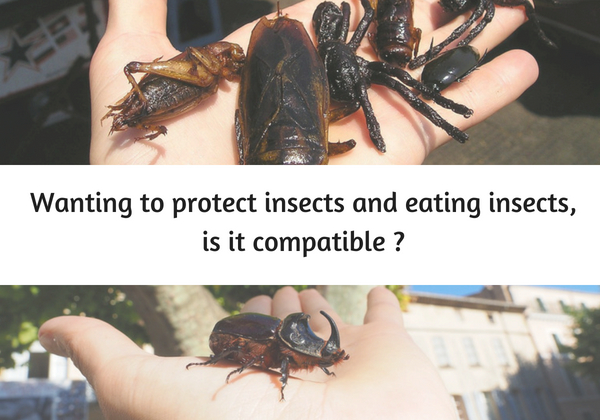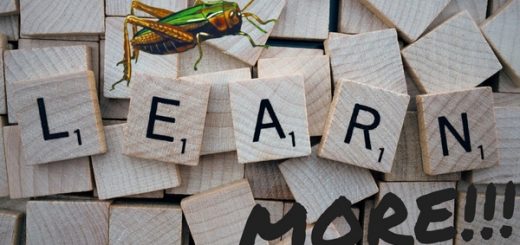Wanting to protect insects and eating insects; is it compatible ?
At JIMINI’S, we just finished our crowdfunding campaign for helping bees protection. When you bought three jars of local honey, all the benefits were offered to Nature and Découvertes foundation. The foundation is working for environmental protection and sustainability. When we were talking about our campaign with a slightly hidden thrill, we sometimes got the following answer:
“You’re willing to protect insects? I thought your goal was to make people eating insects not protecting them!”
Personally, there isn’t any problem to accommodate both of these ideas; but for some people, this situation seems to be ambiguous. When we think about, it makes sense! Always willing to go deeper, I decided to study the topic to understand why I was accepting to have roasted crickets on my plate while wanting to protect insects.

Why protect insects and what does it mean?
We have to admit that insects are fascinating. With more than one million species that have been indexed and at least as much to discover; they represent half of all animal species.
They are living in every terrestrial ecosystem and are involved in each step of the food chain. Insects are on our planet for 400 million years and are the real “specialists.”
They get adapted to every ecological niche to fulfil a unique and essential goal. It is their greatest strength but also their biggest weakness. When the ecosystem is at risk, insect species that are perfectly adapted to it are in danger.
Categorized as pests, insects are the first victims of pollution and pesticides. For the past 20 years, it is up to 80% of flying insects population that have collapsed in Germany.
If we want to protect insects, it is nature and the environment as a whole we need to protect and preserve.
Why eating insects ?
Our food choices have a tremendous impact on our environment. Agriculture and especially animal farming is the second source of pollution on a global scale. Today, there are more than 1 billion people who suffer from malnourishment and as many suffer from obesity. As our population will reach 10 Billion of people in 2050, new food solutions that are sustainable for our planet and healthy for our bodies need to be explored today.
Eating insects represent a global and a local solution to answer our food system issues. High in proteins, vitamins and minerals; insects require little space; few energy and resources to grow. They can also be feed on food by-products that can contribute to limit food waste. Finally, insects are also a healthy and sustainable feed source for fishes and chicken.
Finally, eating insects is a way to open our mind to what we can consider as edible and it leads to rethinking our food choices. They have been part of our diet for more than 1 Million years, and eating insects is a link we share with other primates.
Eating insects while protecting the environment, why can it get stuck?
After several discussions, I identified two kinds of reactions. (I’m not talking about vegans who refuse to eat directly any animal.)
First, there are the “entomophiles” (term used by Jeffrey Lockwood). These are people who fascinated by the beauty and capacities of insects and are often entomologists who use anthropomorphisms to characterise insects. “No, we protect insects, we’re not eating insects.”
This reaction can be understood.
“The more we study these champions of biology’s accomplishment, the more we’re willing to admire, respect and protect insects. Tiny among animals, they are the guardians of life’s on earth, and are also offering us their beauty.” Vincent Albouy*
I’m also fascinated by their capacities and beauty, but I think we can not deny the food solution they could represent.
On the other side, this “love” for insects is a kind of cognitive bias; many of these people were still eating meat. Are other animals less lovable than insects? (That’s complicated… Everyone decides what to put on their plate…)
For many, it’s merely that “insects” are seen as a unique species. We have to continue to work on the outreach aspect. The insects we are eating in Western countries are farmed in a controlled environment and are not collected in the wild.
Moreover, insects represent an entire class of the animal kingdom; just like mammals. It’s like I was saying:
“You have a mammal as a pet, you are a mammal, your family members are mammals, why are you eating other mammals?
Eating insects and protecting the environment, never forget why everything started…
If I think that we can do both, we should never forget why we’re developing this industry.
Right now, even if edible insects in the Western countries are still more a novelty than a real source of protein; it’s only the first step.
Different tasty products using the nutritional benefits of edible insects are coming on the market. And that’s the final goal; bring some variety and limit the environmental footprint of our food choices. As industry’s insider, our mission is to continue the audience education: Which insects can be farmed and eaten and which are better to be observed.
I explained during my talk at “Eating Insects Detroit Conference” that I think that there is no need or benefit to adding some unidentified food in our plate and, on the opposite, we should always keep in mind why we want to develop this industry. Eating insects is a tasty solution, but we need to do it in a right way.
So yes, I think that we can eat insects when are they are sustainably and safely farmed while willing to protect other insects species by protecting their natural environment. And we realise the impact of our food on the environment; we could add more crickets and mealworms on our plate.
I will conclude with a quote from my dear friend David Gracer :
“The best moment to fix the roof is when the sun is shining. It’s not that eating insects is so great, it is that the solution that edible insects represent is so crucial that matters.”.
Resources :
- Histoire remarquable : Les insectes – Vincent Albouy (2015)
- Edible insects and human evolution – Julie Lesnik (2018)
- Intelligence des insectes : l’union c’est la force ? – Vincent Albouy (France Culture)(Février 2017)
- The Gateway Bug (2017)
- La 6eme extinction – Elizabeth Kolbert (2015)
- Insectes comestibles – Perspectives pour la sécurité alimentaire et la nourriture animale – FAO (2014)
- The Infested Mind: Why Humans Fear, Loathe, and Love Insects – Jeffrey Lockwood (2013)
- Why we love to eat bugs and why you should too – Roberto Flore & Afton Halloran (TedX 2017)
*This entomologist wrote a book on edible insects.




Flo, God brings people like you to Earth for good reasons…to save others. Too many are hungry, fleeing impoverished regions, drowning in the Mediterranean, etc. If there was food, they can withstand other sufferings including harsh desert climates. Keep your articles coming… when my business generates healthy profits, I will be supporting your good good. I want to turn insects into food powder, instant food that can be mixed with water. My focus is on the starving masses in Africa. And sending dry powder is cheaper. God bless you and your supporters.
Hello Eddie,
Thank you so much for your comment.
I really appreciate your mission and wish you a lot of success! Where are you located ?
Have a great day
Thank you for this informative article. I will be sharing it to my future students in Crop Protection this coming first semester AY 2018. I am advocating entomophagy and biodiversity conservation and your article offers the best explanation for practicing both and yet remain in the correct path.
Hello Emma, thanks a lot for your kind words.
I really appreciate it !